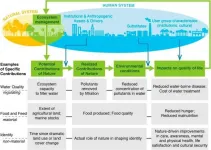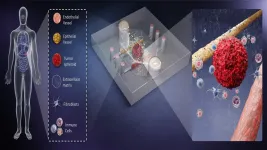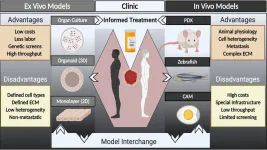Published on 22nd January in Science, the study also provides a completely new understanding of inflammatory disease, opening up new avenues for research on other inflammatory diseases such as rheumatoid arthritis and inflammatory bowel disease.
Part of the global Human Cell Atlas effort to map every cell type in the human body, the new comprehensive atlas of developing and adult skin is a valuable resource* for scientists worldwide. It could also provide a template for regenerative medicine, helping researchers grow skin in the laboratory more effectively.
Our skin acts as a barrier, protecting us against invading bacteria or viruses, and is vital for health. Inflammatory skin diseases such as atopic eczema and psoriasis are chronic conditions, where the immune system becomes overactive, causing itchy or flaky skin that can be very painful and prone to infection. These conditions can have significant impact on people's lives, but the trigger is unknown and there is no cure, with treatments only helping to relieve the symptoms, not the cause.
Skin is a complex tissue made up of many different types of cells. To learn how skin forms and how this relates to adult health and disease, the researchers studied cells from developing skin**, comparing these with biopsies from healthy adults, and eczema and psoriasis patients. Using cutting-edge single cell technology and machine learning, the team analysed more than half a million individual skin cells, to see exactly which genes were switched on in each cell. This allowed them to find out what each individual cell does and how the cells talk to each other.
To their surprise, the researchers discovered that the diseased skin cells shared many of the same cellular mechanisms as developing cells.
Professor Muzlifah Haniffa, co-senior author from Newcastle University and Associate Faculty at the Wellcome Sanger Institute, said: "This Skin Cell Atlas reveals specific molecular signals sent by healthy developing skin to summon immune cells and form a protective layer. We were amazed to see that eczema and psoriasis skin cells were sending the same molecular signals, which could over activate immune cells and cause the disease. This had never been seen before. Discovering that developing cell pathways re-emerge is a huge leap in our understanding of inflammatory skin disease, and offers new routes for finding treatments."
Dr Gary Reynolds, a first author on the study from Newcastle University, said: "While our study focused on inflammatory skin disease, there is potential that other inflammatory diseases such as rheumatoid arthritis or inflammatory bowel disease could be triggered in the same way. This research shows the importance of studying development, and could open up entirely new avenues for inflammatory disease research."
The study uncovered how healthy skin tissue develops, and revealed the cells that are present in adult skin. This has great implications for regenerative medicine, especially for burns victims.
Professor Fiona Watt, co-senior author from Kings College London, said: "There have been decades of research on skin cells grown in the laboratory. However, it is not always clear how the properties of the cells change in the laboratory setting. By revealing the detailed make-up of cells immediately on isolation from developing and adult human skin, this Skin Cell Atlas can act as a template for researchers trying to reconstruct healthy skin in regenerative medicine. Our data is openly available, and we hope this will aid research into creating skin tissue in the laboratory."
Dr Sarah Teichmann co-senior author from the Wellcome Sanger Institute and University of Cambridge, and co-chair of the Human Cell Atlas initiative, said: "Part of the international Human Cell Atlas initiative to create a 'Google map' of the human body, this skin cell atlas study reveals that studying development can not only help understand how tissues are formed in the first place, but also shed vital light on diseases. This map reveals a completely new way of thinking about inflammatory diseases, and is an important reference that other scientists can use to investigate the causes of disease, and inform potential new treatments."
INFORMATION:
Notes to editors:
*Skin Cell Atlas data is publically available via an interactive browsable web portal at: https://developmentcellatlas.ncl.ac.uk/datasets/hca_skin_portal
** The researchers analysed human embryonic skin tissues between 7 and 10 post-conception weeks, provided by the Wellcome- and MRC- funded Human Developmental Biological Resource (http://www.hdbr.org). Healthy adult skin from mammoplasty surgery and skin biopsies from patients affected by atopic eczema and psoriasis were also studied.
Selected websites:
About Newcastle University
Newcastle University, UK, is a thriving international community of some 27,750 students from over 130 countries worldwide. As a member of the Russell Group of research intensive universities in the UK, Newcastle has a world-class reputation for research excellence in the fields of medicine, science and engineering, social sciences and the humanities. Its academics are sharply focused on responding to the major challenges facing society today. Our research and teaching are world-leading in areas as diverse as health, culture, technology and the environment.
The Research Excellence Framework 2014 (REF) placed Newcastle University 16th in the UK for Research Power and the vast majority of our research (78%) was assessed to be world-leading or internationally excellent. Newcastle University is committed to providing our students with excellent, research-led teaching delivered by dedicated and passionate teachers. This is reaffirmed by achieving the best possible outcome - a Gold Award - in the Teaching Excellence Framework (TEF). https://www.ncl.ac.uk
King's College London
King's College London is one of the top 10 UK universities in the world (QS World University Rankings, 2018/19) and among the oldest in England. King's has more than 31,000 students (including more than 12,800 postgraduates) from some 150 countries worldwide, and some 8,500 staff.
King's has an outstanding reputation for world-class teaching and cutting-edge research. In the 2014 Research Excellence Framework (REF), eighty-four per cent of research at King's was deemed 'world-leading' or 'internationally excellent' (3* and 4*).
Since our foundation, King's students and staff have dedicated themselves in the service of society. King's will continue to focus on world-leading education, research and service, and will have an increasingly proactive role to play in a more interconnected, complex world. Visit our website to find out more about Vision 2029, King's strategic vision for the next 12 years to 2029, which will be the 200th anniversary of the founding of the university.
World-changing ideas. Life-changing impact: https://www.kcl.ac.uk/news/headlines.aspx
The Wellcome Sanger Institute
The Wellcome Sanger Institute is a world leading genomics research centre. We undertake large-scale research that forms the foundations of knowledge in biology and medicine. We are open and collaborative; our data, results, tools and technologies are shared across the globe to advance science. Our ambition is vast - we take on projects that are not possible anywhere else. We use the power of genome sequencing to understand and harness the information in DNA. Funded by Wellcome, we have the freedom and support to push the boundaries of genomics. Our findings are used to improve health and to understand life on Earth. Find out more at http://www.sanger.ac.uk or follow us on Twitter, Facebook, LinkedIn and on our Blog.
About Wellcome
Wellcome exists to improve health by helping great ideas to thrive. We support researchers, we take on big health challenges, we campaign for better science, and we help everyone get involved with science and health research. We are a politically and financially independent foundation. https://wellcome.org/




